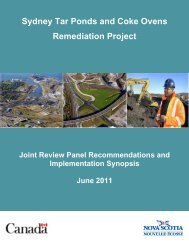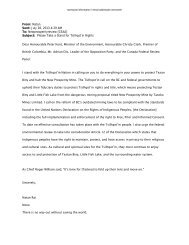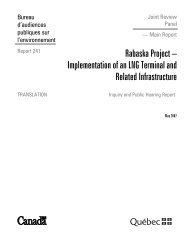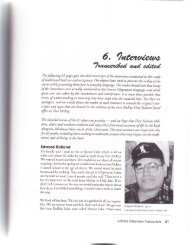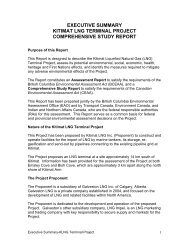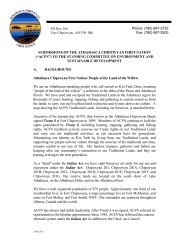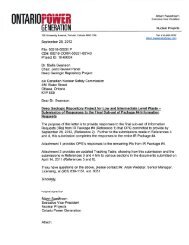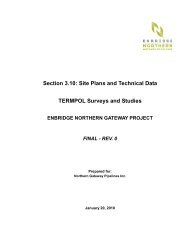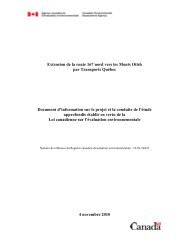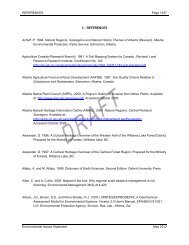Kearl Oil Sands Project
Kearl Oil Sands Project
Kearl Oil Sands Project
You also want an ePaper? Increase the reach of your titles
YUMPU automatically turns print PDFs into web optimized ePapers that Google loves.
to remember the relationship between government and administrative tribunals generally.<br />
55 In Ocean Port Hotel Ltd. v. British Columbia (General Manager, Liquor Control and<br />
Licensing Branch), 2001 SCC 52, [2001] 2 S.C.R. 781, the issue was the independence of members<br />
of the Liquor Appeal Board given their terms of appointment. The Court contrasted the ordinary<br />
courts with administrative tribunals in the following analysis at para. 24:<br />
Administrative tribunals, by contrast, lack this constitutional distinction from the<br />
executive. They are, in fact, created precisely for the purpose of implementing<br />
government policy. Implementation of that policy may require them to make<br />
quasi-judicial decisions. They thus may be seen as spanning the constitutional<br />
divide between the executive and judicial branches of government. However,<br />
given their primary policy-making function, it is properly the role and<br />
responsibility of Parliament and the legislatures to determine the composition<br />
and structure required by a tribunal to discharge the responsibilities bestowed<br />
upon it. While tribunals may sometimes attract Charter requirements of<br />
independence, as a general rule they do not. Thus, the degree of independence<br />
required of a particular tribunal is a matter of discerning the intention of<br />
Parliament or the legislature and, absent constitutional constraints, this choice<br />
must be respected.<br />
56 No one suggests the Commission has a duty itself to consult: Quebec (Attorney General) v.<br />
Canada (National Energy Board), [1994] 1 S.C.R. 159 at 183. The obligation arising from its status<br />
as a Crown entity is to grasp the nettle and decide the consultation dispute.<br />
57 The honour of the Crown as a basis for the duty to decide is compelling on the facts here: one<br />
Crown entity, the responsible Ministry, granted the water licence, allegedly infringing Aboriginal<br />
interests without prior consultation; another Crown entity, B.C. Hydro, purchases electricity<br />
generated by the alleged infringement on a long-term contract; and a third, the tribunal, dismisses<br />
the appellant's claim for consultation on a preliminary point.<br />
B. Did the Commission commit a reviewable error in disposing of the<br />
consultation issue on a preliminary or threshold question?<br />
58 In this part, I identify the appropriate standard of review and apply the standard to the decision<br />
under appeal. I conclude that (1) the standard is reasonableness; (2) the Commission set an<br />
unreasonably high threshold for the appellant to meet; and (3) it took too narrow a view of the<br />
Aboriginal interests asserted.<br />
1. Standard of Review<br />
59 The appellant argues that the Commission has to be correct in disposing of constitutional<br />
issues such as those that arise here. The respondents submit the standard is reasonableness.<br />
Page 24



